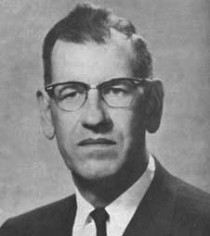
Edward Joseph Young (1907-1968) was Professor of Old Testament at Westminster Theological Seminary from 1936 until his death. He also edited the Westminster Theological Journal.
He had an early interest in languages – having felt a call to the ministry when he was only fifteen and a student at Lowell High School in San Francisco, he thereupon started to study Greek. Following his graduation from Stanford University in 1929 (A.B.), he spent a year in Palestine where he taught school in Bethlehem and studied Syriac with a priest of the Syrian Church. During this same year, he crossed the Sinai desert with another American guided by two Arabs. The trip took a month and was made by camel. His second year abroad was spent travelling through Europe, learning more and more languages, seeing the places where Paul preached, studying in Germany and Spain, cycling through England.
After receiving the Stevenson Fellowship upon graduation from Westminster Seminary in 1935 (Th.B., Th.M.), he married Lillian Riggs Borden and made the trip to Leipzig, Germany, a honeymoon as well as an opportunity to study under outstanding scholars. He was an ordained minister in the Presbyterian Church (USA) from 1935-36 and then in the Orthodox Presbyterian Church from 1936. In 1943 he obtained his Ph.D. degree in Semitic languages from Dropsie College, Philadelphia.
Language with Young was more than a routine study; it was a work of love. He had a speaking or reading knowledge of at least twenty-six languages, and most of these were self-taught. He could pursue studies in Ugaritic, speak German fluently, and preach in Spanish. He reported that he could find a use for every one of his languages in his Old Testament studies. F. F. Bruce said of him, ‘Young speedily established a reputation for himself as the most outstanding Old Testament scholar in America belonging to the older conservative school. His standard of orthodoxy was high, as was his standard of scholarship. He commanded the respect of many scholars who disagreed totally with his theological position, both because of his learning and because of his courtesy. His own beliefs on critical problems were firmly held and faithfully proclaimed, but he did not misrepresent the beliefs of others. He could always be counted upon to state them fairly and not to indulge in denunciation of those with whom he differed.’
E. J. Young’s principal works include The Prophecy of Daniel (1949), An Introduction to the Old Testament (1949), Arabic for Beginners (1949), My Servants the Prophets (1952), Studies in Isaiah (1954), Thy Word is Truth (1957) and The Study of Old Testament Theology Today (1958). He died suddenly from a heart attack in February 1968. John Murray, a former colleague at Westminster, said of him: ‘Edward J. Young adorned his Christian profession. So many were the virtues making up this adornment that it is difficult to single out any for special appreciation. But his humility was so conspicuous that no one could fail to mark it. For those who knew him more intimately his circumspect consistency was no less evident. Unassuming and reluctant to make his own voice heard he was always ready to speak out when the honour of Christ and the claims of truth demanded it. He burned with holy jealousy for the integrity of God’s Word and for the maintenance of the whole counsel of God.’
